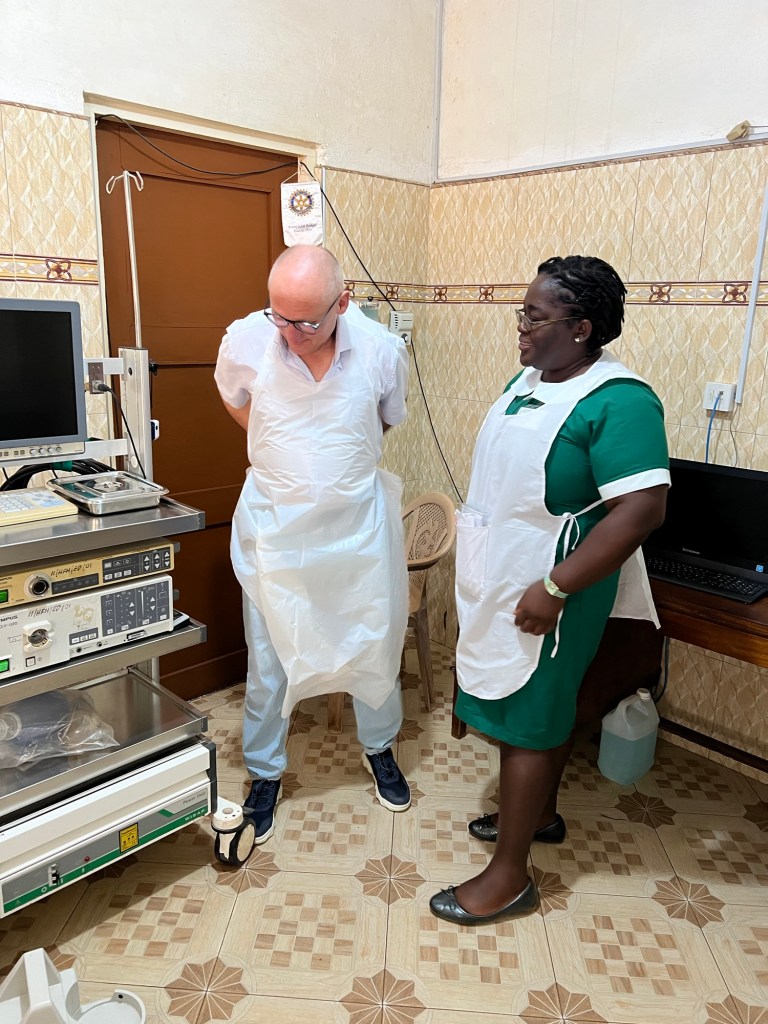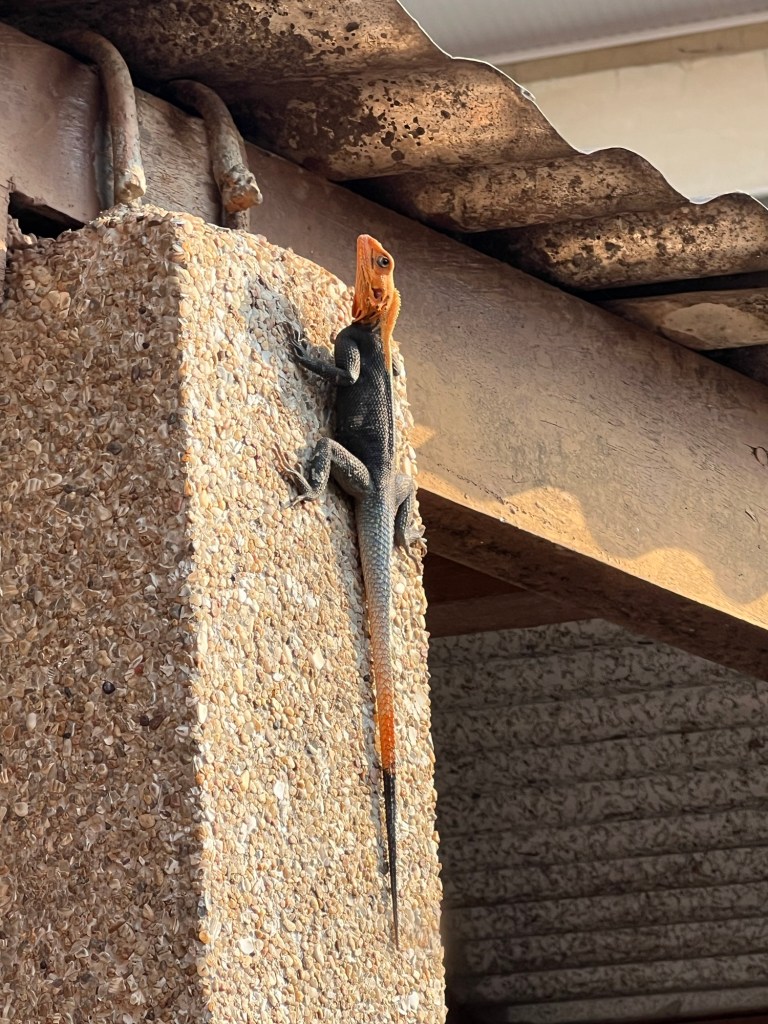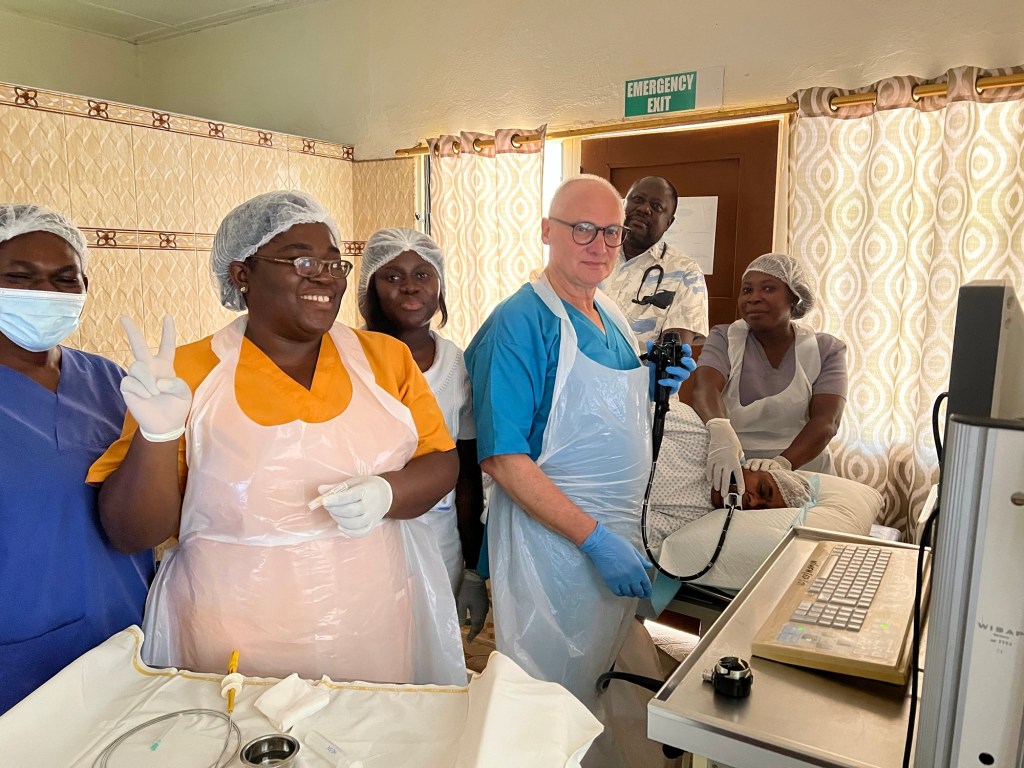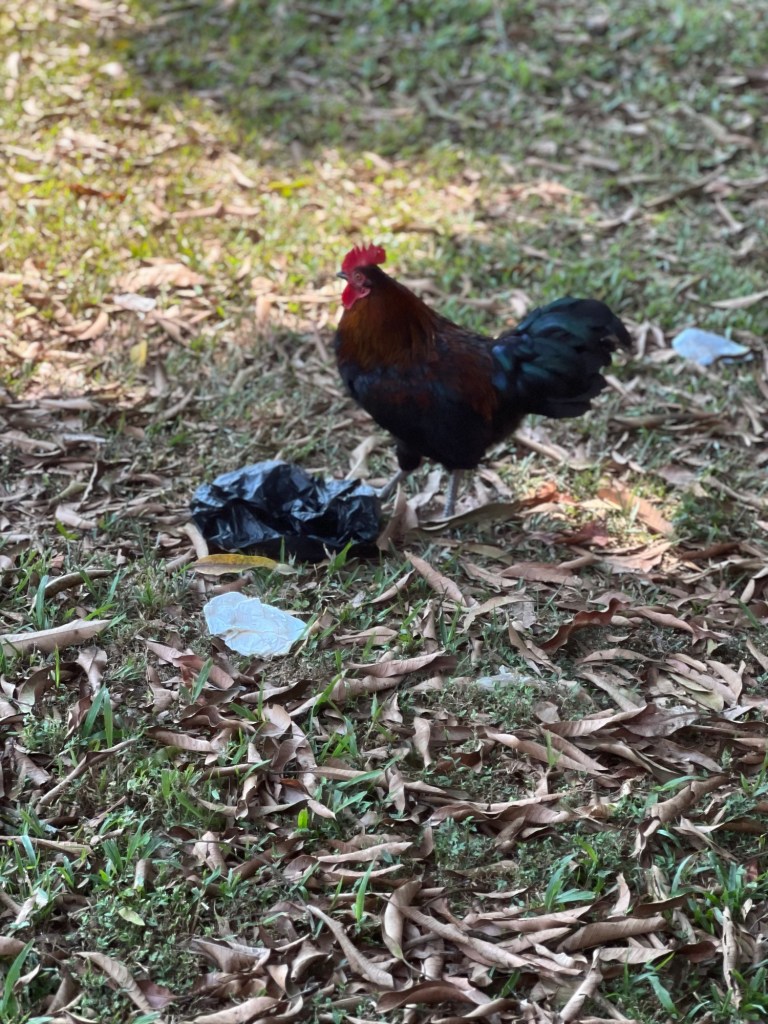14 January 2024
“My name is Dr. Aka. “Your talk was the worst I’ve ever heard.”
More than 680 children came to the opening of our school in Rwanda in January 2023; it was planned for 420 children. Many had no space on our school desks, stood anxiously next to those sitting and wanted to be there. Two school classes are missing – that’s why we organized a lecture in the Vechta cinema and then showed the film: „Gorillas in the Mist“. After my talk, friend Aka came up to me with his disturbing comment. But the sentence and facial expressions didn’t match, so the shock was only brief. Then he told me about the “German Rotary Volunteer Doctors”.

His name is Dr. Jester and I now know why he doesn’t travel to Ghana anymore.
In preparation for my trip, I visit Dr. Hans-Georg Jester, who set up the endoscopy unit at the Holy Family Hospital in Nkawkaw in 2013 and has worked there since then. He collected the money and – I assume – invested it himself for this passion project. The tall, gaunt man is bursting with energy. At that time it was like a virus that infected him: Ghana and hasn’t let go since then.
The only thing that remains unclear is why he won’t be going there any time soon. Why Dr. Aka addressed me and I’m now sitting on booked flights. Finally I dare to ask. “Well, I’m 87 years old,” he replies and we both laugh. That is really enough reason and I secretly calculate that if I followed his example consistently, I would still have 22 years left to continue his work in Ghana.
His was by no means limited to Nkawkaw, but rather to the former bush hospital in Akwatia, which has become a WHO flagship clinic through his efforts. Together with his colleague Michael Schoefer, he has been collecting and organizing donations since 2005 and has traveled there again and again – hands on for ultrasound and endoscopy. Has set up a laboratory and a neonatology unit. Always had something in his luggage. Above all, his experience, his enthusiasm and always an endoscope.
He just made sure that two gastroscopes were repaired and I have them in my luggage. Along with the difficult task of obtaining a customs export certificate before departure (somewhere in Hall 2, opposite KLM, but you’ll find that, it’s important).
My name is Dr. Hardenberg and I are now sitting under a huge mango tree at the guesthouse in the Holy Family Hospital, Nkawkaw, at 29 degrees at night.
To prepare, I completed a tropical medicine course in Würzburg and ordered English-language books on internal medicine, gastroenterology, and palliative medicine. I read them repeatedly. Additionally, I watched English series on Netflix with subtitles. In November, Abdul Hassan, also known as Wumpini from Tamale, Northern Ghana, stayed with us for a week. Since then, I have been confident in my ability to communicate. Although there were times when I did not fully understand him, I believe he also noticed this. It is also certain that he did not always understand me. He would hesitate briefly and rarely ask questions, but he would always laugh and continue talking. Despite this, we were able to communicate effectively. I will apply the same strategy here, except when communicating with Sister Ruth, Endoscopy, because it is crucial to understand her precisely and correctly. This applies to the medical director, Dr. Isaak, and the Reverend Derick as well. My name is Doctor Ralf.
As a young medical student in 1979, when many of you reading this weren’t even born yet, I wanted to at least save the world. Development service as a doctor instead of military service in the Bundeswehr.
A friend put us in touch with the Steyler Missionaries, who ran a mission hospital in Nkawkaw, Ghana. It was actually run by the nuns of the Steyler Missionaries; the missionary himself, Father Norbert, was travelling on a very personal mission, as I later found out to my chagrin. But that was 45 years ago. The missionary orders have certainly come to terms with it all.
I was there for six weeks and, most importantly: I had no idea. Second term – biochemistry, physiology and first impressions of anatomy. I was shocked, it was said, this is the culture shock. I was especially lonely because the nuns were so secretive. At least the maternity nurse took me to the delivery room.

45 years and a whole professional life later, I’m sitting here again. Today, I just want to help make the world a little better. But I already know: the world doesn’t want that, at least not significantly.
My name is Dr. Henner Kraus : “Dear friend Hardenberg. It’s not every day that a colleague comes forward to volunteer in black Africa and then also wants to represent palliative care.”
For more than 10 years, palliative care specialists have been organising week-long introductory courses in palliative care at GRVD (German Rotary Volunteer Doctor) mission hospitals in West Africa. These courses have met with great interest.
So I’m sitting here at my PC in 27 degrees at night translating my palliative care slides with the wonderfully generous support of my colleagues at the GRVD who give me their slides and as I sit here they are travelling to the hospital in Techiman to continue their palliative care support. They have landed in Accra where it feels like 40 degrees at night. After a few days, I comfort them, it only feels like 38 degrees.
Sr. Ruth tells me that there is a palliative care unit in Nkawkaw. So it’s planned and an employee, Peter, is currently in Accra for specialized palliative care training.
Peter is difficult to understand on the phone (see above). One thing is clear: his training continues until September, and the palliative care unit is being built in a new building, which is not yet completely finished. There is no palliative care team yet and that is why I should give a motivating overview lecture. This makes preparation easier. I’ll just come back next year, then everything can look completely different. I still have 22 years until my 87th birthday. Exactly.

My working day begins with the morning medical consultation . The two young physicians who worked day and night over the long weekend look very tired. The older one keeps falling asleep, the younger one is very excited. There was a lot to do, accidents, births, seriously ill people without blood pressure or consciousness. There is open discussion, questioning and analysis. Similar to the morning meetings in german hospitals. Why didn’t you call out your background?
The first endoscopy day: 4 gastroscopies are scheduled. The first patient, who looks much older than her age, has a serious problem. She has not been able to swallow well for 7 months and has lost a lot of weight. In other words: alarming symptoms! In fact, I would later discover a very restrictive and bleeding oesophageal tumour. But first a needle, an injection, sleep. The magic drug Propofol. Five Ghanaian staff members are now gathered in the small room, a large cinema. One of them is filming. The distribution of tasks is not clear, but everyone does their best and finally the operation begins.
With loud (!) music. Felix Mendelssohn – Bartholdy’s Wedding March. Then one spiritual after the other. The young people know all the words, sing along, dance now and then and are generally in a great mood. I have to concentrate, draw up the anaesthetic, inject it and insert the device as soon as my patient is asleep. I have to give her the bad news later.
It’s warm, the air conditioning can barely cope with the heat, the fan is whirring. As I write the report, I turn the music down a little – to the consternation of the young people who support me so enthusiastically. As soon as I’m away from the PC and preparing for the next exam, the music is back on full blast.

It is a Catholic mission hospital. And Ghana is a member of the Commonwealth, a former British colony. The British have certainly dealt with the suffering they caused in West Africa well.
The four examinations last 4 hours. In my high-performance practice in Nuremberg we would have a maximum of one hour for this.
Pictures are saved, folders are created (Dr. Ralf’s Endoscopies) – don’t forget to drink. I leave the room pretty exhausted, also from the music. A large gecko with an orange-red neck sits outside in the sun. Standing upright on its short front legs, it stretches up and moves up and down with lightning-like, rhythmically twitching movements.

This is a surreal experience for me. Anyone who has studied lucid dreams knows that there are dream anchors. These are such unrealistic dream images that the dreamer realizes in the dream: this cannot be true, it does not exist. You are dreaming. The good thing about this realization is that you wake up in the dream and, still dreaming, you know: “I am dreaming”. Then you can start, you can control your dream, walk through walls, fly and experience everything you want. This is of course very individual.
At first I am sure that the gecko is a dream anchor.
But it quickly scurries away as I approach. This is no dream, but Nkawkaw’s Holy Family Hospital and an endoscopy. Bartholdie’s Wedding March was playing as the young people danced in the 35 degree endoscopy room. Dr Ralf stood in the middle of the room.
In the next room, a child cried out in despair, followed by another. Today was circumcision day, apparently without anaesthetic.

In the evening I meet an unexpected, extremely slim, black visitor in my living room. A delicate black snake, a stiletto snake as it turned out. It had apparently been washed into the house through the gutter after a heavy rain. Now it twists and turns without a precise target, but does not attack directly. I found a bowl and put it over it. Then it was quiet, the bowl didn’t move and I didn’t find any more snakes in my guesthouse. The next morning I tell my story and everyone is sure it was a „milleped“, a centipede, but I didn’t see any feet. So it is a centipede, but they’re brown. Finally, a big, strong, experienced man comes and reveals the bowl and the secret. Firstly, it is a snake, and secondly, it is black, and black snakes in Ghana are poisonous. The venom of the Atractapsis Reticulata is not fatal but can cause serious tissue damage – if it bites your finger, it may have to be removed.

My savior comes with a broom and a machete. The snake curls up to protect its head and is later buried in front of the house.
A snake in the house! Now something has to be done. Another gentleman is called who brings with him a large canister of poison and an equally large spray machine. The house needs to be sprayed inside and out. What’s worse, the little snake or the toxin that’s now being sprayed everywhere? I quickly hide my belongings in a cupboard, stow dishes, pots, jugs and my beloved Nescafe. Then I leave them alone. Later, a cleaning crew will turn the entire house upside down and clean it. They are really helpful.

On the way to the endoscopy, a car stops next to me with Doctor Isaac in it, who takes me into the large “theatre”, the operating room. He has a huge tumor to remove, a benign tumor originating from the uterus, which he estimates to be 4-5 kg, a gigantic “myoma”.
I met the patient by chance in his office. She had an enormously big belly and because he is a gynaecologist, I initially thought: she was pregnant. She sat on his sofa and counted a large amount of cedi bank notes over and over again. I assumed she was just paying for the birth, perhaps a cesarean section. He sends her out. She gets up from the sofa with difficulty, but her gait doesn’t match. She walked hunched over, not with the “upright gait of a pregnant woman.” Because she wasn’t pregnant, but had this huge myopia in her belly that I was able to watch being removed today.
It’s a happy place in the “Grand Theatre”, it’s full, lots of young people, some are just there, others have their jobs. Everything was well prepared and organized. Music! British and Catholic again, when Doctor Isaak removed the tumor and proudly presented it is currently playing: Oh Christmas tree, Oh Christmas tree. You stood in splendid beauty!
Nothing in this blog is a lie. I swear!
It’s a big successful operation, the team is super coordinated. Hook holder and surgical towels counted. Wound closure. The woman is 40, the tumor (and other small uterine myomas) are gone and so she can grow old and have more children. Congratulations!

Today there is only one diabetes patient, but that is not entirely certain. Time for the blog.
On Sunday there is a long (!) Catholic service in English and Twi, the local language. The choir has completely arrived during the sermon, it is colourful and loud, they move rhythmically in their wonderfully colourful Sunday clothes, clap, the conductor throws his arms in all directions. It’s very touching, it’s a living church, everyone sings along.
The second endoscopy day is fully booked. The room was full, an anesthesiologist, Dr. Samuel joins us. Great atmosphere, things run smoothly. The anesthesia is deep and the patients are happy. In the next room, a man is screaming at the top of his lungs in such pain that it is almost unbearable. He sustained a serious hand injury that was treated without anesthesia. Young people sit all around and watch the surgeon. It would have been easier with Samuel.
The hospital director is a very interested, well-informed and open priest and takes time for me. The position is clear: the palliative care unit will come this year and, if possible, all employees should take part in the training.
However, endoscopy has a serious problem: there is no longer a doctor in Nkawkaw interested in endoscopy, and it is unclear if and when one will be found. This means that the numbers are dwindling, the routine is diminishing, and patience is required until it can be resumed. At this point, there is a risk that Dr Jester’s pioneering work will not continue.

When it comes to plastic waste, Reverent Derick listens carefully. I experience again and again that people here know the situation and want to change it. I can do my cleanup, he supports it. But what should we do with the garbage collected? There is no recycling in Nkawkaw or surrounding areas. Maybe one in Accra. A cleanup without proper disposal is pointless. I write a concept, contact the recycling units in Accra and Marja from EndplasticSoup (financing secured) and Technology without Borders, Frank Neumann. They react immediately – I am very confident that we will walk around the hospital grounds with many employees and large bags in the next week and collect the plastic, it is lying around everywhere.
Back in the evening there is something long black again, crawling on the floor, this time in my kitchen. This has a lot of legs and I make the diagnosis: Milleped. Don’t touch it, you’ll get an allergy. Don’t worry, call Sister Ruth.

If the Millipeds get scared, they will curl up and play dead Milliped. Just sweep them out with a broom. Door closed again. Outside, the chickens are happy, rustling in the leaves and looking for food. Friends of mine, except for the rooster, who I think often looks at me disrespectfully and especially crows at 5:00 in the morning. Also no handling like he does with the chickens. An enormous downpour comes down. It’s much more powerful than any shower. Things are so much more intense here. What do the chickens do in that rain? Nothing, they shake occasionally and don’t hide. The rain seems to stimulate the rooster more.

In the afternoon I met two young, pale European women, German as it turned out. A nurse, a medical student. Totally excited and totally dedicated. They are waiting. They don’t know exactly what will happen. The next evening they had it all-clear: the young nurse had found her place in the neonatal ward („I’ll never leave it“), the medical student with the pregnant women. So many young women with children in their hands, on their backs and in their bellies. It was amazing.



Abdul Rashid, who visited us in Nuremberg in November, is coming this evening.

Hinterlasse einen Kommentar